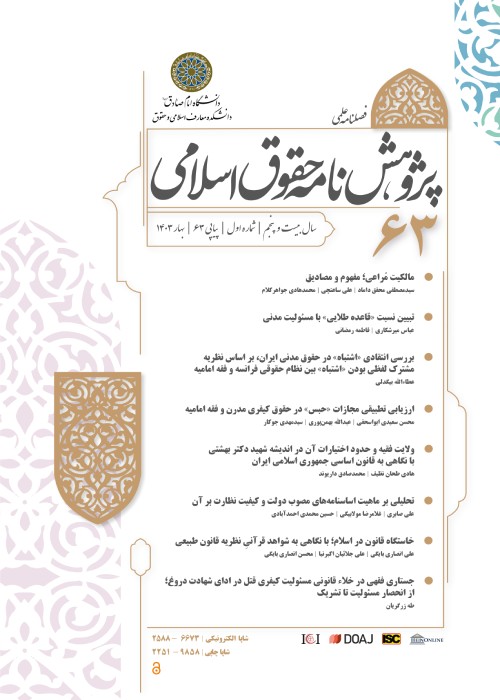Foundations, Functions, and Place of Ethical Principles of Judicial Interpretation in the Iranian Legal System
This article delves into the intricate relationship between law and ethics within the Iranian legal system, exploring the foundations, functions, and significance of ethical principles in the judicial interpretation process. The interdependence of law and ethics is a central theme, emphasizing that a proper understanding of the law often requires consideration of ethical norms. The article navigates through various legal theories, highlighting the debates surrounding the use of ethical arguments in judicial interpretation.
Research Question:
The primary inquiry guiding this research is: what is the extent of the influence of ethical principles on judicial interpretation within the Iranian legal context?
Research Hypothesis:
We hypothesize that ethical considerations play a crucial role in shaping judicial interpretation, acting as a guiding force for legal practitioners in aligning legal outcomes with moral values. The hypothesis posits that the integration of ethical reasoning in the interpretation process contributes to a more just and equitable legal system.
Methodology & Framework, if Applicable:
This research adopts a multidisciplinary approach, drawing from legal philosophy, psychology, and historical analysis. The methodology involves a comprehensive review of legal texts, scholarly writings, and jurisprudential sources, coupled with an exploration of the perspectives of prominent legal philosophers such as Georges Ripert and Ronald Dworkin. The framework for analysis includes an examination of historical legal practices, linguistic considerations, and the psychological impact of ethical reasoning on judicial decision-making.
The study unfolds with an exploration of the historical and linguistic ties between law and ethics, establishing that throughout history, the two have been intrinsically linked. Even positivist legal theorists, who deny any necessary connection between law and ethics, acknowledge the historical interplay between these domains. Furthermore, the linguistic dimension reveals that legal terms and phrases often carry ethical connotations, necessitating a judge's reliance on ethical principles for accurate interpretation.
Addressing the debate between legal positivism and its critics, the paper introduces the concept of "ethical positivism," suggesting that ethical reasoning is not only permissible but essential for ensuring justice in legal interpretation. It recognizes a middle ground that advocates for the judicious use of ethical arguments in certain cases, allowing courts to consider ethical principles in tandem with legal norms to achieve just outcomes.
The research then delves into the perspectives of legal philosophers Georges Ripert and Ronald Dworkin, both of whom have profoundly influenced legal thought. Ripert emphasizes the significance of justice over mere adherence to legal rules, underscoring the judge's commitment to ethical principles even in the absence of explicit legal provisions. Dworkin, on the other hand, advocates for an interpretative approach that reconciles past legal doctrines with societal ethics, positing that judges should strive for consistency and alignment with ethical values in their interpretations.
The paper proceeds to discuss the five dependencies identified between law and ethics: historical, linguistic, ontological, existential, and psychological. Each dependency sheds light on the intricate connections between these two realms and emphasizes the significance of ethical considerations in legal interpretation.
In conclusion, the paper underscores that ethical principles are integral to the proper functioning of the Iranian legal system. While legislation aims to regulate ethical conduct, relying solely on legal ethics is insufficient for achieving the broader goal of ethical transformation within society. The importance of ethical considerations in both the legislative and interpretative stages is emphasized, highlighting the need for a comprehensive approach that integrates ethical principles into the entire legal process.
The research concludes by asserting that ethics in judicial interpretation serves as a vital mechanism for shaping societal relations. Grounded in constitutional principles and Islamic norms, the Iranian legal system provides a suitable foundation for the integration of ethical reasoning in legal interpretation. The study contends that, according to legal and jurisprudential foundations, deducing legal judgments from legal texts based on ethical principles is not only feasible but imperative for fostering a just and equitable legal system.
This research contributes to the ongoing discourse on the intersection of law and ethics, providing insights into the practical applications of ethical reasoning in judicial interpretation within the Iranian legal context. The multidisciplinary approach and comprehensive analysis aim to bridge the gap between theoretical discussions and practical implications, offering valuable perspectives for both legal scholars and practitioners.
- حق عضویت دریافتی صرف حمایت از نشریات عضو و نگهداری، تکمیل و توسعه مگیران میشود.
- پرداخت حق اشتراک و دانلود مقالات اجازه بازنشر آن در سایر رسانههای چاپی و دیجیتال را به کاربر نمیدهد.


